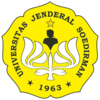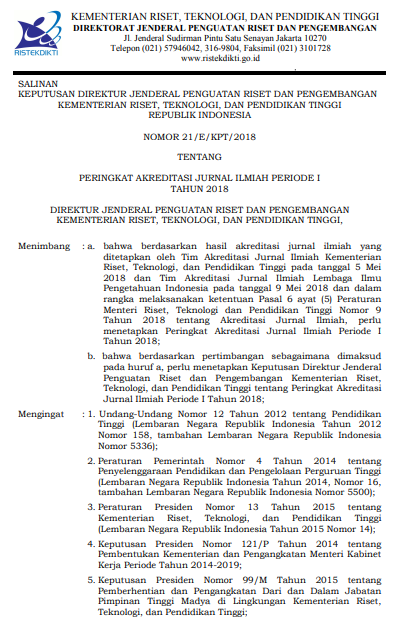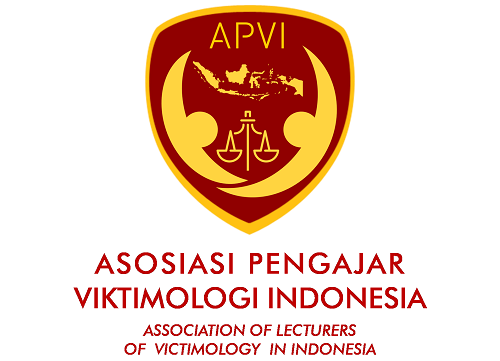Forced Marriage in the Bride-Napping Case in Sumba-East Nusa Tenggara Linked with Positive Law in Indonesia
Abstract
This study was aimed at revealing the customary and legal issues that were applied in the practice of bride-napping in Sumba, East Nusa Tenggara (NTT). The practice of bride-napping does not give women the freedom to choose their life partner and is a violation of the law that could be punished according to article 328 of the Criminal Code (KUHP). This was field research where the researcher conducted direct interviews with the informants and elaborated the data with the related literature. The method used was normative legal research with a literature study approach. The focus of this study was on the ambiguity of the implementation of laws and regulations on the practice of bride-napping. Indonesia has issued Law of the Republic of Indonesia (UU RI) No.1 of 1974 concerning Marriage which regulates the rights and obligations of each person in marriage. Finally, the result of this study was the practice of bride-napping has deviated from its origins resulting in the violations of human rights.
Keywords: forced marriage; bride-napping; Marriage LawFull Text:
PDF View
References
Amar, S. (2017). Perjuangan Gender Dalam Kajian Sejarah Wanita Indonesia Pada Abad XIX, Fajar Historia, Volume 1 Nomor 2, Universitas Hamzanwadi.
Asmin. (1974). Status Perkawinan Antar Agama Ditinjau dari Undang-undang Perkawinan No. 1 Tahun 1974. Jakarta: Dian Rakyat.
Booley, A. (2021). Legal and Social Complexities Relating to Practice of Arranged and forced Marriages, Journal Syariah, Jil. 29, Bil. 1 21-42.
Chantler, K. (2009). Gangoli G. & Hester M., ‘Forced Marriage in the UK: Religious, Cultural, Economic or State Violence?’, Feminist Legal Studies, Vol. 17.
Dressler, J. (2002). Encyclopedia of Crime and Justice. 2nd Edition. New York: Gale Group.
Gill A.K. & Hamed T. (2016). Muslim Women and Forced Marriages in the UK. Journal of Muslim Minority Affairs, Vol. 36/4.
Kaplan, Y, S. (2009). A Father’s Consent to the Marriage of his Minor Daughter: Feminism and Multiculturalism in Jewish Law,’ Review of Law and Social Justice, Vol. 18:2.
Kelompok Kerja Convention Watch, (2007). Rekomendasi Umum No.21 Tentang Kesetaraan Dalam Perkawinan dan Hubungan Keluarga Pasal 16 Konvensi Penghapusan Segala Bentuk Diskriminasi Poin (b).
Lopa,B. (1996). Al-Quran dan Hak Asasi Manusia. Jakarta: Dana Bhakti Prima Yasa.
Mardani. (2011). Hukum Ekonomi Syariah di Indonesia. Bandung: Refika Aditama.
Mtshali, V. (2014). ‘Forced Child Marriage Practiced under the Pretext of Customary Marriage in South Africa,’ Child Abuse Research: A South African Journal, Vol. 15/2.
Nasution, K. (2009). Hukum Perdata Islam Indonesia dan Perbandingan Hukum Perkawinan di Dunia Muslim, Studi Sejarah, Metode, Pembaruan dan Materi dan Status Perempuan dalam Perundang-Undangan Perkawinan Muslim. Yogyakarta: Academia.
Peraturan Menteri Dalam Negeri Nomor 52 Tahun 2014: Hukum adat pada hakikatnya merupakan Hukum Kebiasaan.
Primudiasti, M. (2003). Perlindungan Hukum Terhadap Hak Asasi Perempuan dalam Menyetujui Perkawinan. Dinamika Hukum, No. 19, Tahun ke-IX.
Raday, F. (2003). Culture, Religion, and Gender. International Journal of Constitutional Law, 1(4), 663–715. https://doi.org/10.1093/icon/1.4.663.
Sabbe, A. (2014). Temmerman M., Brems E. & Leye E., ‘Forced Marriage: An Analysis of Legislation and Political Measures in Europe. Crime, Law, and Social Change, 62(2), 171-189.
Samapaty, U, R. (2021). Tokoh Pemuda Sumba. Nusa Tengara Timur
Seda,F. (2021). Dalam penganugerahan Tokoh Muda NTT.Diakses Rabu 2 Nopember 2022. https://www.kompas.id/baca/dikbud/2021/10/05/tiga- tokoh-muda-terima-frans-seda-award-2021.
Soemitro, R, H. (1990). Metodologi Penelitian Hukum dan Jurimetri. Jakarta: Ghalia Indonesia.
Soekanto, S. (2016). Sosiologi Suatu Pengantar. Jakarta: Rajawali Pers.
Syarifuddin, A. (2004). Hukum Islam di Indonesia. Jakarta: Perdanan Media.
Ter Haar. (2011). Asas dan Tatatan Hukum Adat (Beginzelen in Stelsel Van Het Adat Recht). Jakarta: CV. Mandar Maju.
Taranau, D, A, L. (2021). Sekretaris Badan Pengurus Daerah Peruati Sumba, setidaknya ada tujuh kasus kawin tangkap sepanjang 2016 hingga Juni 2020.
Thomas, C. (2009). Forced and Early Marriage: A Focus on Central and Eastern Europe and Former Soviet Union Countries with Selected Laws from Other Countries. United Nations Division for the Advancement of Women.
Women Living under Muslim Laws. (2013). Child, Early and Forced Marriage: A Multi-Country Study. A Submission to the UN Office of the High Commissioner on Human Rights (OCHCR). London: Women Living under Muslim Laws.
Zebari, D. (2013). Forced Marriage and International Human Rights. International Journal of Humanities and Management Science, Vol. 1 (5). 293-295.
DOI: http://dx.doi.org/10.20884/1.jdh.2022.22.3.3220
Refbacks
- There are currently no refbacks.
JURNAL DINAMIKA HUKUM Indexed by :
 | Jurnal Dinamika Hukum | |
| Faculty of Law, Universitas Jenderal Soedirman | Copyright of Jurnal Dinamika Hukum | |
| Yustisia IV Building, Law Journal Center | ISSN 2407-6562 (Online) ISSN 1410-0797 (Print) | |
| Purwokerto, Central Java, Indonesia, 53122 | JDH is licensed under a Creative Commons Attribution 4.0 International License | |






